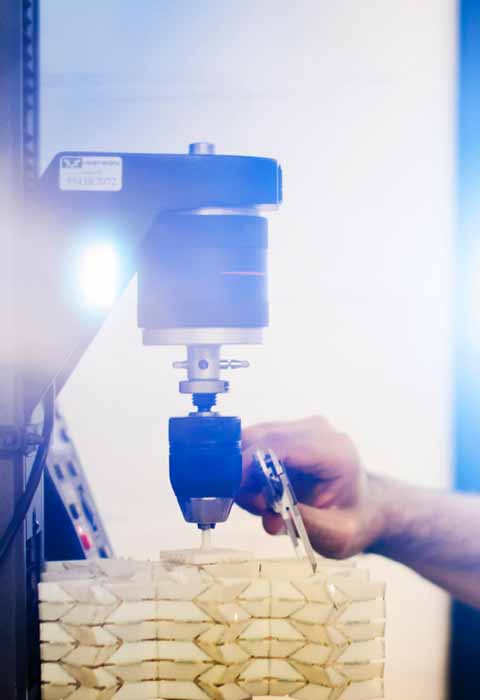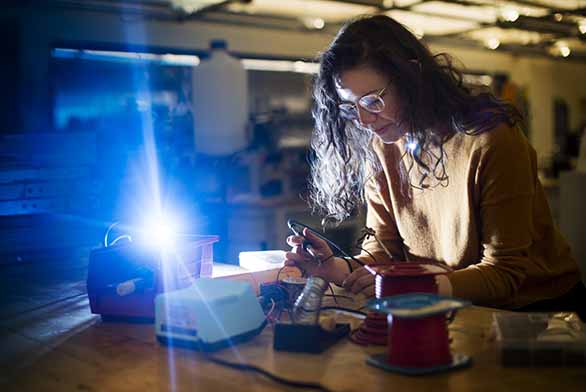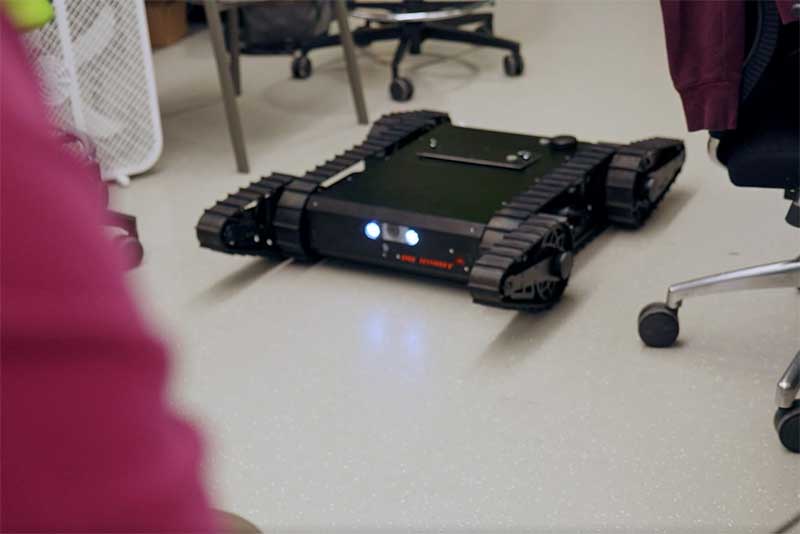
Master of Science in Mechanical Engineering
Master of Science in Mechanical Engineering
Overview
The Master of Science (MS) in Mechanical Engineering has options to pursue a general mechanical engineering curriculum or one with concentrations in Materials Science and Engineering, Mechanics and Design, Mechatronic, and Thermofluids Engineering.
Innovative Curriculum - MS in Mechanical Engineering
At the MS level students may pursue a program preparing for advanced practice or for MS thesis research. All MS students with assistantships are required to complete a thesis. Other students may elect either the thesis or non-thesis option. All course work must have the approval of the academic advisor.
Each year the department receives approximately $10 million in funding to pursue use-inspired and fundamental research in many emerging fields that support and enhance our degree programs. Our federally-funded research centers (e.g., Center for High-rate Nanomanufacturing (CHN), a National Science Foundation Nanoscale Science and Engineering Center, and Healthcare Systems Engineering Institute, funded by the Department of Health and Human Services) demonstrate our leadership in key applications that create knowledge and impact society.
Also, view our department research areas.
Over 15 graduate certificates are available to provide students the opportunity to develop a specialization in an area of their choice. Certificates can be taken in addition to or in combination with a master’s degree, or provide a pathway to a master’s degree in Northeastern’s College of Engineering. Master’s programs can also be combined with a Gordon Engineering Leadership certificate. Students should consult with their faculty advisor regarding these options.
[Listed by concentrations]
- General Mechanical Engineering Concentration
- An ability to identify, formulate, and solve complex engineering/scientific/quantitative problems.
- An ability to explain and apply engineering design principles, as appropriate to the program’s educational objectives.
- An ability to produce solutions that meet specified end-user needs with consideration of public health, safety, and welfare, as well as global, cultural, social, environmental, and economic factors.
- An ability to recognize the engineering tools/principles needed for creative thinking and innovation to propel technical development for industrial applications and/or scientific research.
- Mechanics and Design Concentration
- An ability to identify, formulate, and solve complex engineering/scientific/quantitative problems.
- An ability to explain and apply engineering design principles, as appropriate to the program’s educational objectives.
- An ability to produce solutions that meet specified end-user needs with consideration of public health, safety, and welfare, as well as global, cultural, social, environmental, and economic factors.
- An ability to recognize the engineering tools/principles needed for understanding the motion, deformation, and failure of solid materials in response to the action of direct forces and external fields.
- Materials Science Concentration
- An ability to identify, formulate, and solve complex engineering/scientific/quantitative problems.
- An ability to explain and apply engineering design principles, as appropriate to the program’s educational objectives.
- An ability to produce solutions that meet specified end-user needs with consideration of public health, safety, and welfare, as well as global, cultural, social, environmental, and economic factors.
- An ability to recognize the engineering tools/principles needed for creative thinking and innovation to propel materials and material process development for industrial applications and/or scientific research.
- Mechatronics Concentration
- An ability to identify, formulate, and solve complex engineering/scientific/quantitative problems.
- An ability to explain and apply engineering design principles, as appropriate to the program’s educational objectives.
- An ability to produce solutions that meet specified end-user needs with consideration of public health, safety, and welfare, as well as global, cultural, social, environmental, and economic factors.
- An ability to recognize the tools/principles needed for understanding intelligent and integrated systems and machines by merging electrical, mechanical, computer, material, chemical, and industrial engineering.
- Thermofluids Concentration
- An ability to identify, formulate, and solve complex engineering/scientific/quantitative problems.
- An ability to explain and apply engineering design principles, as appropriate to the program’s educational objectives.
- An ability to produce solutions that meet specified end-user needs with consideration of public health, safety, and welfare, as well as global, cultural, social, environmental, and economic factors.
- An ability to recognize the engineering tools/principles needed for understanding thermodynamics, fluid dynamics, transport, and heat transfer phenomena for industrial applications and/or scientific research.
Gordon Institute of Engineering Leadership
Master’s Degree in Mechanical Engineering with Graduate Certificate in Engineering Leadership
Students may complete a Master of Science in Mechanical Engineering in addition to earning a Graduate Certificate in Engineering Leadership. Students must apply and be admitted to the Gordon Engineering Leadership Program in order to pursue this option. The program requires fulfillment of the 16-semester-hour curriculum required to earn the Graduate Certificate in Engineering Leadership, which includes an industry-based challenge project with multiple mentors. Further semester hours may vary based on Mechanical Engineering concentration.
Concentrations
The MS in Mechanical Engineering has a Materials Science concentration. Materials science has been the key enabler in virtually all engineering breakthroughs that have occurred from early metal ages to the present nano age. In step with the scientific development and discovery of materials, members of the mechanical and industrial engineering faculty are involved in interdisciplinary research to further materials processing, synthesis, and design. Research areas are aligned with Northeastern University’s broad initiatives of sustainability, security, and health, as well as national initiatives in manufacturing and nanotechnology. Investigations in the areas of metals/alloys, polymers, biomaterials (including biomimetics), and composites incorporating nanoscale materials make use of experimental, theoretical, and computational techniques to tailor structure-processing-property relationships in materials for specific applications. Current areas of research include controlling synthesis and assembly processes to produce well-defined atomic structures; defect engineering; manipulating atomic/microstructures and the chemistry of materials to optimize properties for next-generation structural, electronic, and energy applications; solidification and deformation processing; and life-cycle assessments for nanocomposites/materials. Northeastern faculty and students are committed to creative thinking and engineering innovation to propel materials development to the forefront of scientific research.
Advisor: Yung Joon Jung
The MS in Mechanical Engineering has a Mechanics and Design concentration. Students will study the motion, deformation, and failure of solid materials in response to the action of direct forces and external fields. The students will also get a chance to conduct research with faculty and observe how these studies will lead to key engineering innovations and designs. Using complementary analytical, computational, experimental, and design tools, the M&D faculty members conduct research in the design and analysis of engineered functional materials/structures, in mechanics of adhesion and contact, and in biomechanics and mechanobiology. For example, in our biomechanics research, we strive to close the gap between function, form, and disease in the bone by using experimental and computational techniques; also, we explore the mechanics of lipid-based drug delivery vesicles. At the small length scales, we are creating a new understanding of nanomechanics, contact mechanics, tribology, MEMS, and the application of nanomaterials for energy storage systems. Our research and teaching together are designed to prepare students to understand and exploit mechanics to enable their future engineering innovations.
Advisor: Craig Maloney
The MS in Mechanical Engineering has a Mechatronics concentration. The term mechatronics is a combination of the words mechanics and electronics. Mechatronics is a multidisciplinary approach to product design and development, merging the principles of electrical, mechanical, computer, material, chemical, and industrial engineering. The mechatronics and systems research cluster in the MIE department is concerned with systems that are typically composed of traditional mechanical and electrical components but are rendered “intelligent” by the incorporation of sensors, actuators, and computer control systems. Our primary focus in mechatronics and systems is on intelligent and integrated systems and machines along with their practical applications ranging from manufacturing systems and robotic platforms to biological systems. Our research and teaching together are designed to prepare students to understand and exploit mechatronics to enable their future engineering innovations.
Advisor: Rifat Sipahi
The MS in Mechanical Engineering has a Thermofluids concentration. Some of the representative research areas under this concentration may include thermodynamics, fluid dynamics, kinetic theory of gases, and thermophoresis of aerosols; microscale heat transfer phenomena and its effects on laser beam propagation; fundamentals of combustion such as burning speed and onset of auto-ignition measurement and flame stability analysis; development of chemistry reduction such as rate-controlled constrained-equilibrium method; formation and control of combustion-generated pollutants and greenhouse gases; chemistry, transport, and abatement of air pollution; alternative energy sources; combustion-based synthesis of materials; fire propagation, containment, and extinction; nonequilibrium thermodynamics; energy and gas turbine cooling technology; turbine blade cooling; and energy-related and calorimeter studies related to pharmaceutical developments. Our research and teaching together seek to prepare students to understand and exploit thermofluids to enable their future engineering innovations.
Advisor: Mohammad Taslim
Experiential Learning
Northeastern combines rigorous academics with experiential learning and research to prepare students for real-world engineering challenges. The Cooperative Education Program, also known as a “co-op,” is one of the largest and most innovative in the world, and Northeastern is one of only a few that offers a Co-op Program for graduate students. Through this program students gain up to eight months of professional experience employed in their field of interest as part of the academic curriculum, giving them a competitive advantage after graduation.

Academic Advising
The Academic Advisors in the Graduate Student Services office can help answer many of your questions and assist with various concerns regarding your program and student record. Use the link below to also determine which questions can be answered by your Faculty Program Advisors and OGS Advisors.
Admissions & Aid
Ready to take the next step? Review degree requirements to see courses needed to complete this degree. Then, explore ways to fund your education. Finally, review admissions information to see our deadlines and gather the materials you need to Apply.
